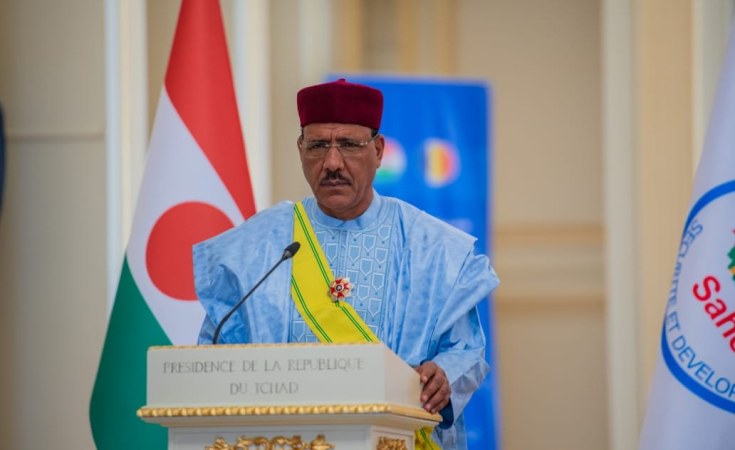Niger had long been considered an anchor of stability in the region. But the attempted coup in the Sahel country could shatter this picture.
From afar, Niger for a long time looked like the last bastion of stability in the Sahel.
In 2021 there was a successful democratic transition of power, while in neighboring countries Mali and Burkina Faso the military staged four coups in quick succession. An attempted coup in Niger during that transition of power was unsuccessful.
But now, even the semblance of stability in Niger is gone. Members of the Presidential Guard arrested the head of state, Mohamed Bazoum. A military spokesman on state TV declared the president deposed and the institutions of the Republic dissolved.
Bazoum himself apparently does not want to accept this: "All hard-won achievements will be preserved," he wrote on Twitter. All democracy- and freedom-loving Nigeriens would take care of that.
Foreign Minister Hassoumi Massoudou only spoke of an "attempted coup" -- the army is not behind it as a whole, he told broadcaster France 24.
In the meantime, however, the military command of the army has backed the coup forces. This appears to be intended to avoid the formation of separate groups within the military, which in the worst case could lead to a war like the one in Sudan.
How bad was the dissatisfaction with Bazoum?
"The president made the mistake of not immediately taking control of the security apparatus. He did not take the time to put his own stamp on this security apparatus," Nigerien journalist Seidick Abba told DW.
During the 2021 election, Bazoum was backed by his predecessor Mahamadou Issoufou, who was not allowed to stand again after two terms in office. Journalist and analyst Moussa Aksar told DW that Bazoum was perceived as a "perfect copy" of his predecessor, much to the chagrin of many Nigeriens.
"The government hasn't changed," Aksar said. "It had promised to fight corruption, but members of the ruling party who committed criminal acts were not bothered."
Ever since Issoufou was in office, the ruling Nigerien Party for Democracy and Socialism (PNDS) has been increasing the pressure on the opposition. Bounty Diallo, a social scientist at Abdou Moumouni University in Niamey, accused the party of lacking democratic culture.
"Instead of allowing a functioning opposition, they are trying to create a unified party," Diallo told DW, adding that this ultimately led to frustration.
What's the mood like in the capital Niamey?
DW correspondent Gazali Abdou spoke with locals in the capital Niamey. One man said the military, including himself, "are not always happy with President Bazoum. So for me it's better to try and then we'll see what happens with the new ruler."
Others expressed concerns about a coup and its possible consequences. One woman said: "It is a step backwards for our democracy because a coup is bad for a country. We therefore call on ECOWAS (the Economic Community of West Africa) and the international community to take action."
By the time the coup attempt loomed on Wednesday, supporters of President Bazoum had already held a rally in support of him. The next day, supporters of the putschists devastated the PNDS party headquarters.
How popular Bazoum actually is among the population is difficult to say. Aside from his record in government, journalist Aksar cites another factor that may have been limiting his support.
"There is also the influence of social media, especially with regard to what is happening in Burkina Faso or Mali," he said. "There is an anti-French sentiment there that poisons society -- including that of Niger."
The ruling military junta in Mali is turning away from the former colonial power France and towards Russia -- apparently also supported by pro-Russian propaganda on social media.
What do the events mean for the region?
Bazoum, on the other hand, was considered a reliable partner of the West, under which Niger was to play an even more important role.
When the international military operation in Mali is to end in five months, Niger will remain the only base for Western troops who are supposed to prevent a complete collapse of stability in the Sahel. For years, Islamist terrorist groups have been intensifying their activities in the entire Sahel region and have repeatedly carried out bloody attacks, including in Niger.
After the coup, German Foreign Minister Annalena Baerbock and Development Minister Svenja Schulze signaled their support for Bazoum and called for a return to the constitutional order.
France moved its last troops from Mali to Niger last year. The German Bundeswehr has yet to take this step, and the hub in Niger was previously planned for this.
"The illusion that Niger is a very stable country that could stabilize other countries in the Sahel region is now gone," says Ulf Laessing, head of the Sahel office of the CDU-affiliated Konrad Adenauer Foundation in Bamako, Mali. "The jihadist groups active in the border triangle with Mali and Burkina Faso, namely the Islamic State and JNIM, will benefit from the coup."
The Bundeswehr and its partners have been training soldiers in Niger since 2018 -- an EU mission is currently being set up. The putsch could put these projects jeopardy.
Nigerian analyst Gimba Kakanda expects international partners to scale back their involvement in Niger. He expects sanctions and a reduction in development aid.
"The government is going to be desperate and will crack down on the people, and it will be distracted from the larger war, the war against terror," Kakanda said, warning that this could further destabilize the region.
With contributions from: Nafissa Amadou, Josephine Mahachi, Eric Topona, Gazali Abdou (Niamey)


